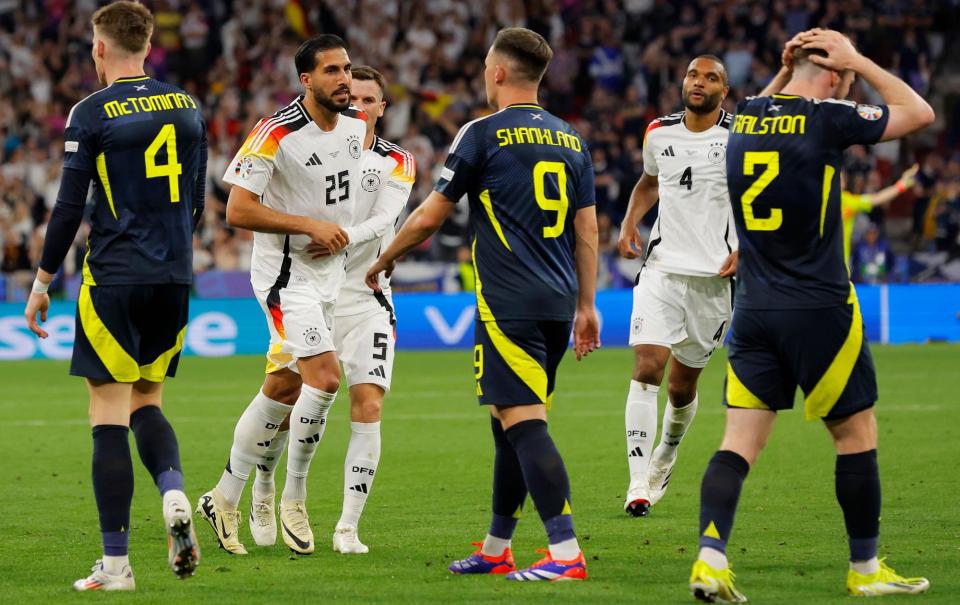Steve Clarke has little to work with to cure Scotland’s defensive hangover

If only the dazed and confused look on the faces of Scotland supporters as they traipsed around a dreary Munich early on Saturday related solely to the impact of local beer.
The pounding suffered by Steve Clarke’s team in the Munich Football Arena only intensified that very feeling inside the heads of the Tartan Army. Scotland can and should lose to Germany at any time, just not in the humiliating circumstances of Friday’s 5-1 rout. Scotland had not been shown up in a tournament group stage in such fashion since the 7-0 loss to Uruguay at the 1954 World Cup.
The one saving grace was that those punters could be spared the video nasty being pored over by the Scotland squad on the morning after the night before. Rabbits and headlights sprung to mind the first time around. Clarke faces a delicate balancing act: the glaring shortcomings on show have to be addressed without already fragile confidence being shattered before Wednesday’s key clash with Switzerland.
Scotland have the oldest squad in this competition, so there is no excuse for stage fright. Clarke must have sleepless nights over his team’s defensive generosity. This has become a theme. Scotland not only lose lots of goals but in all manner of forms. When Emre Can curled home Germany’s fifth, Scotland had shipped 26 goals in 10 games since Cyprus were swatted aside last September. Gulp. The only clean sheet in that spell came against Gibraltar. If Scotland cannot regain the defensive plot, they will join teams of the past in making an early tournament exit. Scotland do not score nearly enough to be so wobbly at the back. This combination is a fatal one.
There are two elements to the ominous goals against column. Nobody can seriously begrudge Scotland losing to Germany, France, England or the Netherlands. What is unacceptable is the ease with which these teams breeze through the defence. Scotland actually played pretty well in Amsterdam before shipping three goals in the closing 18 minutes. On Friday it was two and game over inside the first 20. The starting point for any positive result against superior opposition is a solid base; Scotland do not appear to have one. They look physically and mentally fragile.
The second galling statistical group shows Georgia put two past Scotland in this grim run, Norway notched three and Finland, having been 2-0 down at Hampden Park, were able to claim a deserved draw. Northern Ireland needed only one goal to win in Glasgow, caused by defensive calamity.
Focus will fall on the touch points of tactics and personnel. Clarke made interesting comments after the forgettable friendly win over Gibraltar this month. The manager suggested playing four in defence had been useful with the future in mind. Clarke has stuck pretty rigidly to a back three, a system deemed necessary to fit Andy Robertson and Kieran Tierney into the XI. If Clarke really is pondering a switch, Tierney’s role would become a point of intrigue. Robertson, as the Scotland captain, will always take his place at left-back.
The Germany episode was a collective Scotland failure. The midfield did nothing to assist defenders, either positionally or by landing effective tackles. Scott McTominay’s display was his worst in a Scotland jersey. Callum McGregor, technically an excellent footballer, looked overawed. The less said about the performance of John McGinn the better.
One glance at Clarke’s defensive options emphasises his conundrum. Angus Gunn once had aspirations of playing for England. At 28, the Norwich man is an average Championship goalkeeper who does nothing particularly special. He erred for two of Germany’s goals. This position is horribly problematic for Clarke, given the dearth of emerging talent.
Ryan Porteous displayed regular immaturity at Hibernian, which it seemed fair to assume had at least been tempered by a move to Watford. He proved a leopard cannot change its spots with the horrendous lunge on Ilkay Gündogan that reduced Scotland’s number.
Porteous had been preferred at centre-half to Grant Hanley, who missed the bulk of the season with Norwich. Hanley is a go-to guy for Clarke, yet in that Finland friendly he was flat-footed and ponderous. Scott McKenna has been deemed surplus to requirements at Nottingham Forest. Liam Cooper’s contract will not be renewed by Leeds. Jack Hendry is a decent option but only that; his switch to Saudi Arabia last summer did plenty for his bank balance but little for his competitive standing.
Aaron Hickey’s absence with a serious hamstring injury always looked the most damaging pre-tournament problem for Clarke. It was only when the Brentford player took his spot in the Scotland team that the broader fanbase realised how good he is. Without him the same has become even more clear. Scotland have no right-back with anything close to his defensive capability. The calmness of Hickey would have been oh so vital as Scotland players ran around with their hair on fire against Gündogan and co.
Scotland have bounced back from adversity before. After the infamous loss to Costa Rica in the 1990 World Cup, Sweden were seen off in Genoa. A similarly stirring response is needed against Switzerland. For that to transpire, Clarke – once a defender of high standing – must reboot his shoogly backline. Without that, Scotland are destined to be known as the gift that keeps on giving: goals.

 Yahoo Sport
Yahoo Sport 






































